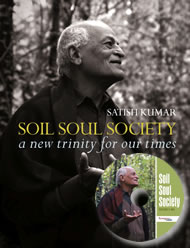Satish is less well known here in the states than the others, but he's been shining his light since he began his walk around the world to urge nuclear disarmament in 1962. Since 1973 he's been working and editing the magazine Resurgence, a voice for the interdependence of humans and the natural world and subsequently founding Schumacher College. When you are with Satish, you realize you are with a wise soul.
All the more reason perhaps that his newest book, Soil, Soul, and Society reverberates that soulfulness.

Some excerpts worth sharing:
The meaning of the word 'education' is to bring out what is already there, the potential of every student. Every soul has its own built-in intelligence. For example, every seed has its own built-in tree. A forester does not need to put a tree in every seed; his or her work is to nurture the seed and help to bring the tree out of it. In a similar manner, a professor or teacher is not to consider a student an empty bucket that needs to be filled with information. A teacher needs to observe the student, spot the potential and help the student in such a manner that the dormant potential can emerge.[pp.111-12]
In summarizing Schumacher's thesis in Small is Beautiful, Satish writes:
Organizations are conceived and built for some ideals such as caring for the health of people, or providing education for the young, or producing and distributing food for people, or caring for the environment. Large scale organizations tend to get bogged down in the maintenance of the organization itself, and the ideals for which the organization was set up seem to become secondary. Large scale often forces people to be at the service of the organization, whereas small scale tends to make the organization at the service to the people.
One of the primary tests of an organization is whether it turns people into instruments to perpetuate the system and sees people as a means to an end, or whether the organization exists as a means and people are the end. Large business organizations aim to maximize profit and then people become subservient to the profit motive, whereas smaller business organizations are better able to maintain a balance between the well-being of its members and the community they serve, as well as keeping an eye on the bottom line.
Similarly, large government organizations become obsessed with their hold on power Other human, social, and ecological considerations become subsidiary to the overriding imperative of remaining in control, even if lip service is paid to improving public services or maintaining sustainable development. [pp.131-32]
Soil, Soul, and Society cracks open the seed of possibility and nurtures its potential to become a better world for all. Reading it will feed the soul.
